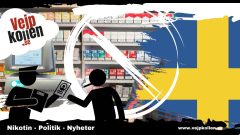"Why do politicians care about a rubbish issue like snus and nicotine? Don't they have more important things to do?" This is one of the most frequently asked questions in Vejpkollen's social media comments section, at least at election time. But in the flurry of 'Swexit' comments and angry outcries about corrupt EU politicians, it's quite obvious that the issue of nicotine is attracting attention.
Why is this the case?
The European Parliament elections are here and the votes have already started to come in. At the same time, the debates are going on until the very end. One of the issues that has risen to the top of the agenda is the future of nicotine pouches - also popularly known as white snus. For some, this is absurd. How can a question about a product, which in most media contexts is portrayed as everything from "a trick to entice children to become nicotine addicts" be something that politicians care about, other than by talking about outright bans?
Yes, maybe because politicians are good at reading the room?
White snus in everyday life
White snus, e-cigarettes and snus are products that are closer to 1.5 million Swedes use regularly. Almost 800 000 of these people prefer white snus or nicotine pouches as they are actually called. White snus is also a product that Swedish companies largely produce and export to other EU countries. However, as Sweden is a member of the EU, we have to comply with certain EU-wide directives. One of these is European Tobacco Products Directive (TPD) which currently covers cigarettes and e-cigarettes. The directive is now to be revised and will very likely in the future also cover include nicotine portions and white snuff.
This means that politicians in Parliament should take a position on new rules (restrictions, possible bans, etc.) of a product that is not only regulated in Sweden, but also affects many people and businesses - in their everyday lives.
So it is quite reasonable that the issue is raised before the elections - regardless of what you think on the matter.
Many parties are in favour of
Not all parties have responded directly to Vejpkollen's questions about future TPD revisions or the future of white snus in EU legislation. Nevertheless, other organisations and media have been active on the issue and it has been possible to get a fairly clear picture of where politicians stand on this. Kudos to Alcohol and Drugs, Teachers against Tobacco and The Snus Commission who contributed in various ways to this coverage.
Naturally wants to attract voters
So nicotine may be an issue that to some people seems quite small. But the fact that politicians have actually chosen to raise the issue suggests that they see a strategic value in it. If you can get 1.5 million Swedes, who use some form of smokeless nicotine, to step up, it could have an impact at the ballot box. That is - they get a mandate to fill in a parliament where the nicotine issue is just one of many issues. But mandates are mandates - and votes are votes.
Nicotine - an infected issue
The nicotine issue is an ideological watershed. For some, it's a question of freedom - we should be able to decide for ourselves what we put in our bodies, what substances we like - and so on. For others, it's a question of balance of power. The narrative that tobacco companies manipulate us into becoming addicted to nicotine is central to this faction and the 'fight' against an 'insidious industry' becomes highly symbolic. This often results in various proposals for far-reaching bans and strict controls on products that are popular on the market.
Harm minimisation - a pragmatic solution
Another aspect - which is actually gaining ground - is the issue of harm reduction: that nicotine users should be guided to use products that cause less harm than those caused by smoking. In Europe today, nearly 25 per cent of the population on average. And at a time when smoking causes enormous harm - but also leads to large societal costs - regardless of who makes money from nicotine, there can actually be great benefits in regulating smokeless nicotine products more favourably than cigarettes. Harm minimisation is a strategy that, if managed properly, can have very positive effects for everyone.
The consumer perspective
Whatever you think, the outcome of the upcoming TPD revision will have major consequences, not least for us consumers - those of us who actually use e-cigarettes, white snus or other forms of smokeless nicotine. For many of us, it is a crucial factor in keeping us smoke-free. For others, it's an acceptable way to actually enjoy nicotine in everyday life. A cup of coffee (or energy drink,) in the morning along with a vejp or snus - is for many a very important ritual that actually affects their whole life. We want to be able to continue doing it - as safely as possible.
Politicians would be wise not to underestimate this.
READ MORE:





They are not wise if they ban the snus we are many who snuff here in Sweden